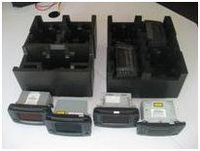Arpro Packaging Protects Navigation Units on Their Longest Journey
 |
BANBURY, UNITED KINGDOM – July 22, 2009: A new packaging solution is helping Alpine Electronics, producers of original-fit navigation systems for Mercedes-Benz vehicles, to protect the parts on their very first journey. Thirteen different types of unit, produced to exacting Mercedes-Benz specifications, are shipped up to 6,500 miles from Hungary and Japan to the carmaker’s final assembly sites around the world. During elements of these journeys, the systems are protected from shock, moisture and electrostatic damage in custom-designed dunnage trays made of ARPRO.
To ensure that the Alpine equipment always arrives in perfect condition, the ARPRO packaging was designed to meet extremely demanding protection criteria. In developing the trays, JSP engineers subjected prototypes to an extended six day vibration test designed to simulate the rigours of arduous journeys by road, rail, sea or air.
In order to maximise the efficient utilisation of shipping containers, the trays had to deliver the required degree of protection while keeping overall package size to a minimum. To achieve this, JSP selected a “shock rib” design that uses stiff, but narrow ribs to hold each unit firmly in position while isolating it from the outer walls of the container.
To simplify packaging management, JSP also designed the dunnage trays so that all 13 units could be shipped in only two different package designs. Units typically used in vehicles assembled in the USA and Brazil are shipped three to a tray, while other regions are shipped four to a tray.
A critical element in the design was the provision of protection against electrostatic damage. JSP delivered this using ‘dissipative’ grade ARPRO for the trays. This reduces surface resistivity to less than 106 Ω, and promotes rapid static decay to protect against sparking. Without such additives, the flexing of non-conducting packaging materials during transport can develop static charge potentials that could damage the equipment within. Avoiding such damage is of critical importance as it is often difficult to spot during initial testing, only emerging later in the life of the vehicle as early equipment failure and an increase in warranty claims.
Alpine and Daimler AG now have over 15,000 dunnage systems in use. At the end of the project the trays, like all ARPRO products, can be fully recycled.
“We are very proud to have been selected to supply Alpine and Daimler AG on such an important project,” says Paul Compton, JSP’s Executive Vice President and Chief Operating Officer - Europe. “The unique properties of ARPRO, combined with our own extensive experience designing packaging for the most demanding environments, have delivered a solution that fulfils all their requirements.”


